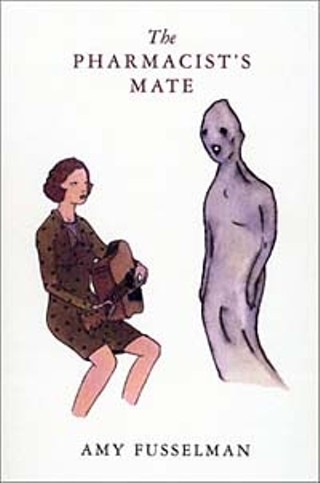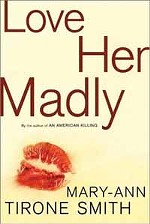Postscripts
The Pharamacist's Mate is Amy Fusselman's precise (86 page) meditation on trying to get pregnant with her husband Frank while reacting to her father's death. But it's also a kind of anti-memoir.
By Clay Smith, Fri., June 1, 2001

New McSweeney's Book
The fourth publication from McSweeney's Books is called The Pharmacist's Mate, and it's written by Amy Fusselman, who will be at BookPeople on Friday, June 1, at 7pm, to talk about it. McSweeney's Books is the book-publishing outfit of Dave Eggers' McSweeney's publications (www.mcsweeneys.net, www.mcsweeneys.com, www.mcsweeneys.org, and McSweeney's the print journal, the sixth issue of which was recently published). In the press release "notes" that accompany The Pharmacist's Mate, the publisher says, "There is almost no way to communicate how moving this book is. It is very moving. See? We did it no justice. We are serious. This book will be loved by those who read it." This winking subversion of the typical press release -- which tends to go on and on for days with flagrant adjectival abuse -- is borderline cute and adorable, but its brevity is also quite appropriate given the thing it describes. The Pharmacist's Mate is Fusselman's precise (86 pages) meditation on trying to get pregnant with her husband Frank while reacting to her father's death. Last year, Fusselman entered a contest run by McSweeney's in which the person who could write the best book about electrical engineering on boats would have that book published by McSweeney's. This is not a book about electrical engineering on boats, although Fusselman's father was a medical aide -- a "purser-pharmacist's mate" -- who served in the merchant marine beginning in 1945, so boats are in the book, and there is a passage about AC/DC, the heavy metal group.
Throughout The Pharmacist's Mate, Fusselman excerpts the diary her father kept of his first eight months at sea; what the reader initially considers a memoir about birth and death is in reality a double-fisted, alternately funny, alternately affecting wallop of a book. "I want to talk to my dad, but my dad is dead now," Fusselman writes near the beginning. "I know we can't have a regular conversation so I am trying to stay open to alternatives. I am trying to figure out other ways we can communicate."
The Pharmacist's Mate is composed of close-to-the-bone but seemingly nonessential little paragraphs that dot the landscape of the narrative in a manner reminiscent of those restless creatures that erupt from Whack-a-Mole games at amusement parks. "Air is very interesting now," Fusselman tells us, kind of out of the blue. "I can spend a long time sitting in my apartment, looking at the air." Instead of being a navel-gazing exercise in recollecting one's personal moments, though, The Pharmacist's Mate is a book that refreshingly calls into question the entire idea of memoir. In fact, it's kind of an anti-memoir. Fusselman leaves many things lurking and unexplained, and in that way, at least, her book reads like good fiction (something it has in common with A Heartbreaking Work of Staggering Genius). "I guess it's just all those things about memoir that there are to be afraid of," Fusselman told me several days ago from Los Angeles, where she was on tour. "And I feel like Dave is someone who dealt with this so well, it's just raised the bar for everyone else. Certainly we feel things deeply, we all do," but she stipulated that a story is uninteresting "when it becomes this 'feeling porn.'"








